The Northern Salvo
Incorporating Weekly Notices, Sectional Appendices, and Northern Weekly Salvo
Published at Station House, Kents Bank, Lancashire-North-of-the-Sands, LA11 7BB and at 109 Harpers Lane, Bolton BL1 6HU (both Lancashire) email: paul.salveson@myphone.coop
Publications website: www.lancashireloominary.co.uk
No. 318 April 2024
Salveson’s half-nakedly political digest of railways, tripe and secessionist nonsense from Up North.
Easter special
Quite a lot has happened since the last Salvo, with some positive developments with the Station library and some big news about the Rocket 200 celebrations of the opening of the Liverpool and Manchester Railway – 2030 may see a good way away but it will soon come round and there’s lots that can be done in the run-up to the anniversary. I’ve steered clear of politics (apart from an historical piece on English Socialism). What is there to say? It’s so bloody depressing, particularly in Ukraine and the Middle East, but not a lot of room for optimism here at home. But, for all that – have a lovely Easter break.
Rocket 200
I’m delighted to say that I’ve recently been appointed chair of Rocket 200. Here is the press release from Rocket 200 which was sent out earlier this week:
“Manchester Histories, in collaboration with partners National Museums Liverpool, Metal, Manchester Science Museum, Manchester University, Liverpool City Council, Manchester City Council, St Helens Council and Network Rail, is proud to announce the appointment of two distinguished individuals to steer the Rocket 200 project towards its ambitious goals for 2030 after a public recruitment process. Professor Paul Salveson will serve as the Chair, accompanied by Jessica Bowles as the Vice Chair.
The Rocket 200 project was originally developed with Manchester Histories and partners in 2021 to explore how best to celebrate the 200th anniversary of the world’s first inter-city railway between Liverpool & Manchester. This encompassed several key objectives: fostering community regeneration along the railway line, delving into the depths of the UK’s industrial past, shining a global spotlight on the
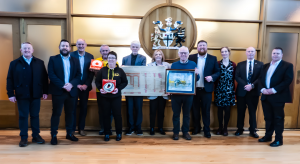
North West as a hub of innovation and international influence, and providing a distinctive platform for cultural, engineering, and community engagement. During 2023 the Steering Group has been consulting and researching options for these activities with partners. It is now ready to develop the next phase of its programme, supported by Paul and Jessica’s leadership.
Professor Paul Salveson brings a wealth of experience and expertise to his role as Chair. With a career deeply rooted in the railway industry, Professor Salveson has been a trailblazer. He is credited with originating and developing the concept of ‘community rail’, which has led to establishing over twenty community-rail partnerships across the UK and Eastern Europe. As president of the South-East Lancashire Community Rail Partnership and a member of Bolton at Home’s Operations Committee, his commitment to community engagement and empowerment is unwavering. Rocket 150
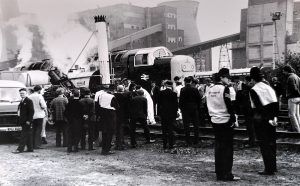
Professor Salveson is a visiting Professor at Bolton and the University of Huddersfield in the Department of Transport Logistics where he shares his knowledge and expertise to the next generation of leaders. Additionally, his role as manager of the new Kents Bank Station Library underscores his dedication to preserving and promoting local history. Paul is also the author of the recently published book ‘Lancastrians – Mills Mines and Minarets’ which highlights the role of railways in the North’s industrial transformation.
Jessica Bowles will be joining him as Vice Chair and her public and private sector experience will complement Paul’s. Jessica brings over 25 years of experience in generating investment and fostering growth in cities through expertise in economic policy, strategy, and commercial development. Her career has seen her emerge as a trusted leader in various capacities, including the senior civil service, local government in Manchester, and at the board level of Bruntwood, one of the UK’s most forward-thinking property companies. As Director of Strategic Partnerships and Impact at Bruntwood since April 2016, Jessica plays a pivotal role in shaping the company’s strategic direction and driving cross-sector partnerships to enhance both business value and the wider economy.
Together, Paul and Jessica will spearhead Rocket 200 towards achieving its mission of celebrating and preserving the story of Rocket 200 past, present and future. Manchester Histories is acting as the lead organisation for the project for the next three years. “
For media enquiries or further information, please contact: Karen Shannon CEO Manchester Histories: karen@manchesterhistories.co.uk
Manchester Histories
Manchester Histories is an award-winning charity that works collaboratively to reveal and celebrate the stories of the people and places of Greater Manchester and beyond. It connects people through histories and heritage to explore the past and shape the future, valuing all voices in the telling, preserving, and celebrating stories.
It was established in 2012 and delivers a year-long public and community engagement programme, and the biennial Manchester Histories Festival is now in its 9th edition. Manchester Histories is proud to be part of GMAST (Greater Manchester Arts Sustainability Team). This network brings together the cultural and creative community across Greater Manchester to address the climate and ecological crisis.
Past projects include Peterloo 2019, a project to mark the 200th anniversary of the Peterloo Massacre; DigiFest 2020, a celebration and recognition of the 50th anniversary of the Chronically Sick and Disabled Persons Act (1970); Manchester Histories Festival 2022, History of Climate Change which explored the local and global climate crisis.
“History Matters. It connects people with those who’ve gone before and those who’ll come after. We support people to explore these connections. It’s why our work is vital.”
Facebook facebook.com/manchesterhistories
Instagram instagram.com/manchesterhistories
Twitter (X) twitter.com/mcrhistfest
Happy anniversaries
The Liverpool and Manchester isn’t the only important railway anniversary – 2025 is the 200th anniversary of the Stockton and Darlington Railway. Local authorities in the area have been very active in developing their plans with Railway 200 formed to promote railways
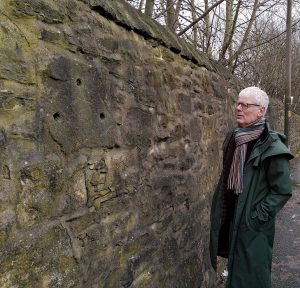
on a national level. More in future Salvoes. In 2028 it’s the 200th anniversary of the Bolton and Leigh Railway, Lancashire’s first public railway and two years ahead of the Liverpool and Manchester. The first locomotive was ‘Lancashire Witch’ – wouldn’t it be great to have a replica built! A committee is being formed to take forward ideas – email The Salvo if you’re interested in being involved. The Cromford and High Peak and Canterbury and Whitstable are also 200 in 2030.
Station Library doings
Kents Bank Station Library continues to develop with well-attended monthly open days and talks (see below). For now, the Library will be open once a month, normally on the second Saturday of the month – the next open day is Saturday April 13th, from 11.00 to 3.30 pm. Entrance is via steps next to Beach Hut Gallery (also open). Teas, coffee and biscuits available – as well as sale of surplus books there is also an expanding ‘lending’ section.
The library is open for reference/study purposes by appointment – ring 07795 008691 or email info@stationlibrary.org.uk . We continue to receive generous donations of books and railway ephemera, which are very much appreciated.
The Library has started a series of monthly talks. We’ve christened them our ‘Mutual Improvement Class’ (MIC) reviving a railway
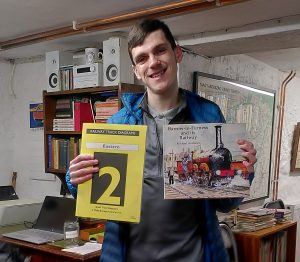
tradition that goes back to the beginnings of the Railway Age. The most recent talk was by retired Blackburn locoman Raymond Watto, speaking on his ‘Memoirs of a Lancashire Engineman’. Raymond started his railway career at Lower Darwen shed, moving to Blackburn and then Preston depots. He was fireman on 70013 ‘Oliver Cromwell’ on the famous ‘Fifteen Guinea Special’ marking the end of steam on August 11th 1968.
The next talk is on Wednesday April 10th with Tony Parker speaking on how the impressive station buildings at Carnforth were saved from demolition and became what is now the Railway heritage Centre. The talk is at 14.00 and must be pre-booked. Ring 07795 008691 or email info@stationlibrary.org.uk .
We’re also going to start publishing ‘occasional papers’ on aspects of railway social history.
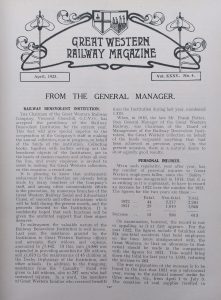
The first will be a three-part paper by John Kolodziejski, ‘London Bridge Freight Guard: Life on BR on the 70s’. John went on to become a journalist with the FT; this memoir offers a fascinating glimpse into life during a period of rapid transition on the railways. It will be posted on the library website shortly.
We continue to get donations of railway and transport-related books. Thanks to Peter in Altrincham for donating 400 Oakwood Press titles – filling in some major gaps in our collection of branch-line histories.
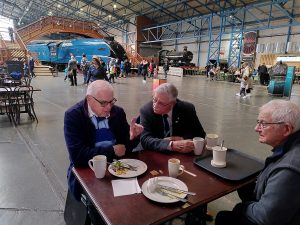
We recently had a trip to York to meet Frank Paterson and Mike Webb from Friends of the National Railway Museum. We did a mutually beneficial ‘book swap’ and we came away with some real gems, including several bound volumes of the Great Western Railway staff magazine, going back to 1907. I’ll give you a few examples of their stories in later Salvoes. Keep an eye out on www.stationlibrary.org.uk
Postal address: Station House, Kentsford Road, Kents Bank, Grange-over-Sands LA11 7BB
Footplate Passenger
I’m delighted to tell you about a very special event we’ve got coming up on Friday April 19th at the Station Library, on Kents Bank Station.
Bob Waterhouse will be launching his book ‘Footplate Passenger: the Locomotive Journal writings of E.S. Waterhouse’ (with a foreword by myself). This is no ordinary railway book. It is a selection of the writings of E.S. Waterhouse, a Methodist minister between the 1930s and 1960s. The book is illustrated by the great photographer Denis Thorpe, who worked with Bob on The Guardian.
Like many clerics, Waterhouse had a love of railways and steam engines, but he took this to amazing heights. With the permission of the railway companies he had a footplate pass to ride in the cab of express trains across the British railway network. He become good friends with many ‘top link’ engineman and wrote about their exploits.
These were published in the loco drivers’ union paper – ‘Locomotive Journal’ under the heading ‘As The Passenger Sees It’. Some of the articles are politically radical; Waterhouse was aware of the looming threat of fascism in the 30s and the importance of strong unions to protect workers’ interests.
His grandson Bob Waterhouse, a retired Guardian journalist, has put together several of his articles and is publishing the book next month; we are really proud to be hosting the launch at our unique station library at Kents Bank, on the scenic Lancaster – Barrow line, on Friday April 19th at 12.30 for a 12.45 start.
Salvo readers are very welcome to join us – but please let me know if you can come as space is limited. There will be drinks and light refreshment and review copies of the book will be available.
Railwaymen (and women!) remembered
The following personal accounts of railway life came out of an oral history class I taught, called ‘Railwaymen Remember’, for the University of Leeds in 1994. The class members were mostly retired drivers, a few former guards and signalmen and one remarkable lady, Eunice Bickerdyke, of Normanton (below). The stories were put together as ‘Messroom Gossip’, but were never published. I’m hoping to feature some of the stories in the next few issues of The Salvo. Hope you enjoy them!
Eunice Bickerdyke
“I started in January 1949 on the London Midland at Normanton. I had to attend formal classes in Railway Operating and Railway Geography. These were evening classes. I also had to attend HNC typing class on two other evenings, and the Ambulance Class on the fourth evening! I attended some education classes organised by the TUC and the National Council of Labour Colleges.
I started in the clerical grades in the 1940s and was sent bto be trained at Wakefield College. I then went to a post in Manchester. There was a Ms Glydill who ran the typing pool. There weren’t so many opportunities for women then. By the 1960s it became easier to get promotion, including into management positions. Very often your prospects were tied in with your boss’s. If he was promoted, you were promoted with him.
As well as looking after pay and conditions, there was a great social life in the RCA (Railway Clerks’ Association – now TSSA). There were weekend trips to the seaside and all sorts of excursions.
Railway work used to be seen as a job for life, but you were often forced to move. Sometimes, if the company wanted to get rid of you, you’d get instructions on Friday afternoon to “report at 6a.m. at Port Talbot, Monday morning.” If you were forced off like that, you couldn’t sign on, as you had, technically, resigned. Sometimes you were forcibly promoted! My father was station inspector at Normanton during the war. He was ‘invited’ to become station inspector at Bletchley, but he refused. It meant that any future promotion would be virtually impossible. Firemen were often instructed to transfer, if there was a shortage. And you had to go.
You couldn’t move from one company to another, or, after nationalisation, from one region to another. But both the LNER and the LMS covered a vast territory. The LMS went down into South Wales and up to the west of Scotland.
The railway police often had to lodge. My husband left home on Friday afternoon and went up to Newcastle, for a football special going to London. He slept that night in a sleeping car in the sidings. He got home Sunday dinner time! I worked for a time in York. I was sent on a course in Devizes on ‘How to deal with staff problems’ – but I’d never had any staff problems before! Anyway, I had a lovely time. It helped make me more aware of potential staff problems, at least.”
Fred North
Fred came from a West Riding railway family. His father was a driver at Manningham shed, Bradford, later Holbeck. He drove the famous test runs over the Settle-Carisle Line with Jubilee loco 5660 ‘Rooke’ in 1936. Fred started his footplate career just before the outbreak of the Second World War and retired in the 1970s. He was booked as a driver in the 1950s and worked at Manningham, Copley Hill, and finally Holbeck sheds.
Company rivalries
“There’s always been rivalry between the different railway companies. It’s still there among older railwaymen! We used to call the LMS ”Let Me sleep”! But there was often a nasty edge to it. I can remember drivers on the GN saying about a transferred driver, ”Don’t talk to him, he’s a Midland man”. I used to like the GN gauge lamps, and I’d often
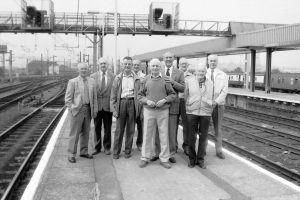
try and swap a few cloths for one of them! The rivalry could get serious when promotion was involved. When someone came in from another shed he’d put you back for promotion. It wasn’t his fault of course. But often these transferred men were treated with hostility.
I remember worrying when I transferred to Copley Hill, the GN shed, I was a Midland man, and I’d seen men at Holbeck sent to Coventry by some of the other men. I always challenged this, and I’m glad to say that I was well received at Copley Hill.
Fun and games – and ghosts
Many Tunnels had their own resident ghost, often near running water, for special effects. Bramhope was particularly wet, the ghost must have worn a mac all the time. Some tunnels were built on rising gradients and you’d often start slipping on the wet rails: Sometimes you’d lose all sense of whether you were moving forward, standing still, or going backwards! The only way you’d know was by sticking your shovel out of the cab, to touch the tunnel wails.
In the days of loose-coupled freight it was easy to end up breaking couplings or giving violent snatches which could result in the guard at the back of the train being thrown across the van floor and getting badly injured. There was one place which was notorious, near Bingley. I was a young driver and my father advised me the best way to tackle the dip. “Keep the buggers going! ” he said. He insisted that the best plan was to keep steam on hard after slowing down before Bingley. I tried it out, and we went storming through Bingley tunnel, only to find the distant was off for us but for the slow line. There was a 20 mph slack from fast to slow. We hit the points at something more like double that. Anyway, we held the rails but I was a bit angry with my dad. He repeated his opinion, adding that I must have just been a bit soft to worry about coming off the road. There wasn’t any snatch, was there?
A Passed Fireman once took the quickest way into the Holbeck Mess Room, he ran a locomotive into it! He was on the turntable with a loco and the road off the table was on a rising gradient. He had trouble
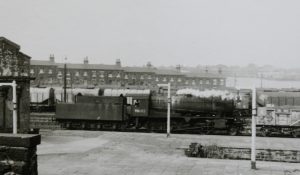
moving the loco so he wrenched the regulator fully open. The loco moved all right, straight into the mess room wall! The main casualty was the mess room cat: it ran off in terror and obviously found a less dangerous abode.
There were some perks in working on the footplate. We had jobs to Heysham where you could sample the nettle beer. It was delicious! And at Kentish there was a place that sold lemonade, not ordinary lemonade. You could taste the lemons!
We used to have a regular express passenger job to Carlisle; We’d always get sandwiches from the dining car lads when we got to Carlisle. One day, we arrived and there was no sign of our ‘treats’. I got up on the tender and ‘put the bag in’ to take water, and then one of the attendants appeared. ”1’m sorry we’ve no sandwiches today” he said, ”the chef has been busy. But would you accept this?” And he pulled out an enormous pork pie, together with a silver tea service! We split the pie in half and took most of it home.
Toilet tricks
If you were caught short on the bookplate, you’d use the shovel! You’d have be careful not to use the shovel for catering purposes after! I remember being on a Morecambe excursion, returning to Leeds. We stopped at Skipton and two men came up to us from out of the train. They explained that their female companions needed to use a toilet (it was non-corridor stock with no toilet). I gave them a bucket which was duly returned at Keighley!
I was with one driver at Manningham shed for some time. He was always playing tricks. One day he was leaving Bingley, with a young lad firing for him. When they got into the tunnel he grabbed hold of the lad’s neck. The lad was terrified and asked if he had got hold of him. The driver replied he hadn’t, he must have been grabbed by the ghost of a dead platelayer who haunted the tunnel. He was run over by an engine and had a grudge against locomen.
There were different working practices. Eastern men – or GN men, as we called them – never did any hooking on. We Midland men always did! Sometimes a train would wait for hours for someone to hook on because the GN men wouldn’t do it.
When I signed up during the war I was asked what I wanted to do. I said ‘railway work’ – but I ended up bridge building! I had no interest in this at all, and eventually I got my own way.
Lodging Turns
Our link had 18 lodging turns in 12 weeks, We would lodge at Carlisle, Burton, Derby and other places. I had one driver who never lodged all the time I knew him! He’d always find a ruse to avoid it. He’d find a fault on the loco or claim he didn’t know the road.
Some of the lodging houses were very comfortable. The house at Carnforth was run by a nice lady, Mrs Marshall, who kept the place immaculate. The food was good too. It was normal for footplatemen
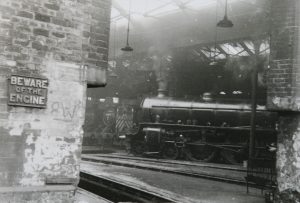
to take their families there for a holiday in summer! The Lancaster lodge was a cold place and we always took coal to keep warm. Mrs Lockhart was stewardess at Carlisle Kingmoor lodging house (it’s a hotel now). It was rum place. On my first visit she told me to be careful if I went into town there were a lot of bad women in Carlisle. Unfortunately, I didn’t find any!
The Kentish Town lodging house just had a series of cubicles, with no roof over them. You could hear everything and some drivers snored heavily! There was only one chamber pot, and when it was full someone chucked the contents out of the window.
I was lodging in London after Kentish Town Lodge had closed. I was sent to Ilford but it was miles away. So I went to a place called the Hampton Castle, near Kings Cross. That was a right doss-house. The staff were ignorant. I got a meal but no spoon so I asked for one. They refused, and said I should have asked for it when I ordered my meal! I kicked up a right fuss.
Carlisle had several lodging houses – Upperby, Durranhill, and Kingmoor. Kingmoor had a lot of Scotch lodgers. They were big, hefty men. In the middle of the mess room there was a table with a big bowl of fat. They’d ladle some up to make a fry-up, and then sling the fat back in when they’d finish. God only knows how old that fat was! Most of them used to make a big pot of tea, with a bowl of porridge. Their tea was something else. They’d brew up and leave their tea pot behind the back of the heating boiler and leave it there until the following day. There were dozens of these teapots, talk about liking your tea stewed. Ugh!
We’d often cook onions in the cab. We’d stick one behind the injector handle and it would cook a treat. It was quite a common delicacy. It would roast slowly, and be a delicious treat after an hour or so. My mate used to take his false teeth out first, wash them out in a firing bucket, then eat his onion.
War
My first trip to London as a fireman was at the height of the war. The driver was Lionel Bateson. At Bedford we were told it was ”Air Raid Alert Red”. As we headed south towards London the sky was lit up, bright red, by fires and bombings When we arrived at St Pancras the station was quiet, but we could hear bombs exploding all round the city. We headed for the lodging and found some other Leeds men already there. We then heard the anti-aircraft guns at Hampstead Heath start firing and then there was a massive explosion and lots of shattering glass. All the lights went out, but after the dust had settled nobody was injured.
We went out to have a look round and collect some souvenirs. There was a huge crater directly outside the building with lots of tangled metal. It turned out to be a land-mine which had exploded on impact after being dropped by a German plane. It was a lucky escape! One Leeds fireman was killed by a bomb, it ripped his leg off and he bled to death.
During the war there was a regular train for expectant mothers. It left St Pancras at 10 am every day, for Derby. Buses were waiting there to take them to a home in Alfreton.
There were a lot of black American soldiers stationed in Britain, and they were rigidly separated from the white Gls. We worked a special train which was specially for black Gls and two white Americans got in by mistake. They got badly beaten up.”
More to follow in next month’s Salvo.
Walt Whitman and Northern Socialism
This is an outline of my talk for Wakefield Socialist History Group on February 23rd 2024, at The Red Shed. My book With ‘Walt Whitman in Bolton’ gives a fuller account of the connections but is almost out of print. I’m looking at doing a new edition.
The great poet of American democracy, Walt Whitman, had a huge influence on the early British socialist movement. The man whom many acclaim as the United States’ greatest-ever poet had very close ties with a group of friends, many of whom were active in the Independent Labour Party (ILP), in Lancashire. Each year, on May
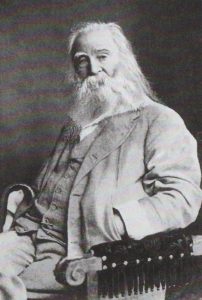
31st, they celebrated Whitman’s birthday on the Lancashire moors with readings from his poetry, wearing sprigs of lilac and passing round a loving cup of spiced claret. Since 1985 the tradition has been revived, and has become a popular event for both socialists and the gay community.
The central figure in the Bolton group was J W Wallace, an architect’s assistant with Bolton firm Bradshaw Gass and Hope. He was a close friend of both the Glasiers and Keir Hardie, and a member of the ILP’s National Administrative Council. Wallace used this position to promote his almost fanatical devotion to the prophet of comradeship and the open air and had some measure of success.
Most socialist publications in the 1890s carried adverts for ‘Leaves of Grass’, Whitman’s ever-changing collection of his writings, and his poetry featured in most collections of socialist verse. Labour’s Garland – Poems for Socialists, published by The Huddersfield Worker and edited by James Leatham included an excerpt from Whitman’s prose on the cover and part of ‘Song of the Redwood Tree’ and ‘To a Foil’d European Revolutionaire’ amongst the poetry.
What made him so popular? Whitman cut a striking figure, with a shock of white hair and beard, wearing a cap perched at a jaunty angle. He was almost sanctified by the early socialist movement in England, particularly in the North. The Bolton socialist Allen Clarke wrote in 1919 that ‘it is fitting that Bolton should be distinguished above all towns in England by having a group of Whitman enthusiasts, for many years in close touch, by letter and visit, with ‘the Master’, for I am sure Walt Whitman, the singer of out-door life, would have loved to ramble our Lancashire moorlands.’ (published in book form in ‘Moorlands and Memories’, Bolton, 1920).
The correspondence with Whitman started with a birthday greeting
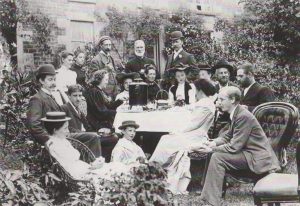
sent in 1887, signed by Wallace and his friend Dr John Johnston. Whitman was touched, and there began an exchange of letters which cast a lot of fascinating light on Whitman himself and on life in Lancashire in the late nineteenth century.
Whitman died in 1892, but by then a firm friendship with other American ‘Whitmanites’ had been established with this small group of enthusiasts in the town which was then at the heart of the Lancashire cotton industry. They called themselves ‘The Eagle Street College’ after the modest two-up two-down terraced house where the group’s mentor, J.W. Wallace, lived with his parents in the mid-1880s. They used to meet at Wallace’s home each week to discuss Whitman and other great thinkers and poets of the time. Wallace moved to Adlington, a small village on the edge of the Bolton moors, in the mid-1890s and this encouraged the group to come to visit and explore the magnificent scenery around Rivington and Anglezarke.
The highpoint of the group’s social calendar was the celebration of Whitman’s birthday. The day included a brisk walk up to Rivington where they would be entertained by the Unitarian minister Samuel Thompson. There would be readings from ‘Leaves of Grass’ and the passing round of a ‘loving cup’ containing spiced claret. More of ten than not Wallace would deliver an ‘address’ on the political and spiritual significance of Whitman. But basically they had a good time and were able to work off the claret on the walk back down to the railway station at Adlington.
The group were, at least initially, mainly lower middle-class men who included clerks, a journalist, clergymen and one or two skilled workers. They were not a metropolitan intelligentsia, but neither could they be described as representative of Bolton’s industrial working class. They were probably typical of the sort of person drawn to the young Independent Labour Party with its message of ethical, rather than Marxian, socialism. As Fred Wild, an early member of the group commented ‘these young men were all from the Parish Church and for the most part were engaged as clerks or minor gaffers and were attracted to Wallace by his personality and intellectual powers.’
Wallace had a wider circle of friends who were infected by his love for Whitman, including Keir Hardie, founder of the Labour Party, who frequently visited him in Adlington. Edward Carpenter, Robert Blatchford and the Irish co-operator Horace Plunkett were amongst his friends and correspondents. Whitman and Carpenter were particularly close friends and Carpenter visited the poet in America. Whilst Carpenter was overtly gay, Whitman kept his sexuality something of a mystery, though America’s modern gay community has claimed him as their own. Much of his poetry is a powerful celebration of love between men, with some strongly erotic themes and imagery. Equally, he was the poet of spirituality and comradeship, and love of the open air.
Whitman’s birthday will be celebrated, as usual, on the nearest Saturday to his birthday (May 31st), which means it should be Saturday June 1st. Details in a future Salvo.
Lancastrians: Mills, Mines and Minarets
The first three months of the year has been a busy time for talks on my ‘Lancastrians’ book. The most recent was to the Historic Society of Lancashire and Cheshire, in the fine surroundings of the Athenaeum in Liverpool. More to come in April and May; please contact me if you would like more details.
The book itself isn’t a ‘conventional’ history and covers different themes of Lancashire history, including sport, culture, politics, industry 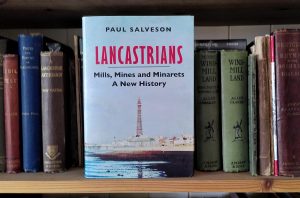 and religion. It explores the Lancastrians who left for new lives in America, Canada, Russia and South Africa, as well as the ‘New Lancastrians’ who have settled in the county since the 14th century. There are about forty ‘potted biographies’ of men and women who have made important (but often neglected) contributions to Lancashire.
and religion. It explores the Lancastrians who left for new lives in America, Canada, Russia and South Africa, as well as the ‘New Lancastrians’ who have settled in the county since the 14th century. There are about forty ‘potted biographies’ of men and women who have made important (but often neglected) contributions to Lancashire.
It’s available, published by the highly-respected publishers Hurst whose catalogue is well worth a look at it. See https://www.hurstpublishers.com/catalogues/spring-summer-2023/.
The book is hardback, price £25 (hopefully there will be a paperback out this year). Salvo readers can get a 25% discount by going to the publisher’s website (www.hurstpublishers.com) and enter the code LANCASTRIANS25 at checkout.
Still in Print (at special prices)
ALLEN CLARKE: Lancashire’s Romantic Radical £4.99 (normally £18.99)
Moorlands, Memories and Reflections £15.00 (£21.00)
Last Train from Blackstock Junction (published by Platform 5 Books). A collection of short stories about railway life in the North of England. Salvo readers can get the book at a specially discounted price, courtesy of Platform 5 Publishing. Go to https://www.platform5.com/Catalogue/New-Titles. Enter LAST22 in the promotional code box at the basket and this will reduce the unit price from £12.95 to £10.95.
The Settle-Carlisle Railway (published by Crowood £24) – can do it for Salvo readers at £12
See www.lancashireloominary.co.uk for full details of the books (ignore the prices shown and use the above – add total of £3 per order for post and packing in UK)
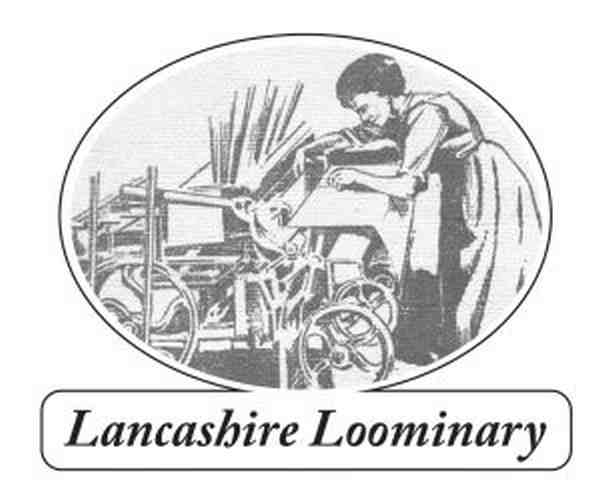
3 replies on “Northern Salvo 318”
Rocket 200? Crikey, I remember attending Rocket 150 and it seems like yesterday. I’ve an album full of photos of the event.
It’s a pity MoSI (Manchester) rolled over and accepted NR’s ‘shilling’ to withdraw their objection to the location of the Ordsall Chord. Building it where it is finished the MoSI railway (where I was volunteer footplate crew on ‘Planet’ and ‘Agecroft No.1’). The oldest railway station in the world lost its live steam replica 1830 trains!
One can only imagine the situation if Steve Davies had remained MoSI Museum Director; we may well have retained the 1830 railway (while still getting a slightly re-located Ordsall Chord), and no doubt Steve would be organising a mega celebration for the 200th anniversary!
Thanks for the text of the Whitman talk which I was sorry I missed. He is part of the non-statist anarcho-socialist tradition much neglected by the Left today.
One element of the Rocket 200 plans which would interest me would be some attention to the manner in which knowledge of steam railways spread so quickly in this period. Maybe this would be worth a seminar?Within a couple of years there were detailed plans for railways in Germany, France, Belgium, the USA, even Australia or parts of South America! There was correspondence from the Nürnberg-Fürth Railways with the Stephensons about buying locomotives (and hiring a driver) and with English ironmasters about rails and chairs; the fact that the Birmingham & Gloiucester was importing American-built Norris locos so early shows how this became an international technology with design and manufacture and export in many countries. So – some context would be illuminating and research into how knowledge spread. (This applies also of course to the development of a ‘standard gauge’).